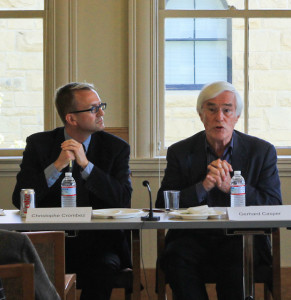Economics Professor Michael Bordo argued in support of establishing a pan-European central tax authority Tuesday afternoon, stating that “the unique experiment” of the eurozone should be paired with a fiscal union if it wants to survive the test of time.
At an interdisciplinary panel co-sponsored by the Europe Center and the Hoover Institute, Bordo warned that for many members of the European Union (EU), especially Greece, “the continued forces of the backlash against austerity, social unease and negative growth could mean an exit of those countries from the eurozone.”
The panelists, including experts in economics, political science and law, shared their thoughts on the viability of the EU’s Economic and Monetary Union and discussed what should have been done in response to the European sovereign debt crisis that has crippled the region.

“Behind all of this is the need for deep, serious political union where countries will have to relinquish some sovereignty,” Bordo said.
Ronald McKinnon, professor of international economics, labeled the early debates that surrounded the establishment of the euro as completely missing the true threat to its longevity, which he said is “debt default.” McKinnon said that lawmakers presented “purely monetary arguments, leaving out the key problem.”
“There were no central fiscal regimes set in place to deal with sovereign debt crises,” McKinnon said. He added that this problem is exacerbated when “a country does not own its own central bank.”
According to McKinnon, countries whose debt was not as creditworthy as the more economically sound members of the monetary union were able to “dramatically increase spending and grow the size of the welfare state” because of their membership in the eurozone.
University President Emeritus Gerhard Casper discussed the problem in more political terms, critiquing the many layers of bureaucracy that preclude any tighter political union between nations. As a way of questioning the lack of central leadership in Europe, Casper invoked the words of former secretary of state Henry Kissinger by asking, “Who do I call when I want to call Europe?”
Casper presented the “dizzying” number of groups that command political weight in Europe and discussed the most recent attempt to solve the euro crisis — the Treaty on Stability, Coordination and Governance in the Economic and Monetary Union — a document whose immediate effect he argued will be “more meetings.”
The treaty would require member countries to secure debt levels at below 60 percent of gross domestic product (GDP) and include balanced budget provisions in their constitutions.
Casper outlined the numerous obstacles to this plan, which he said mainly hinges on the differences in economic conditions in constituent members of the eurozone and the ability of Brussels, the EU’s de facto capital, “to administer the rest of continental Europe.”
Casper ended on the note that “the solutions to this crisis will mainly involve muddling through.”
Christophe Crombez, visiting professor at the Stanford Europe Center, argued that “whenever it has been faced with a crisis, Europe has eventually done the right thing.”
Panelists went into greater detail about the various established and yet-to-be established mechanisms to keep the euro crisis from getting worse. The audience, consisting mostly of faculty, was receptive to the talk.
“I thought it was fascinating, and it was great to hear so many points of view,” said John Hochstatter ’15 of the talk.